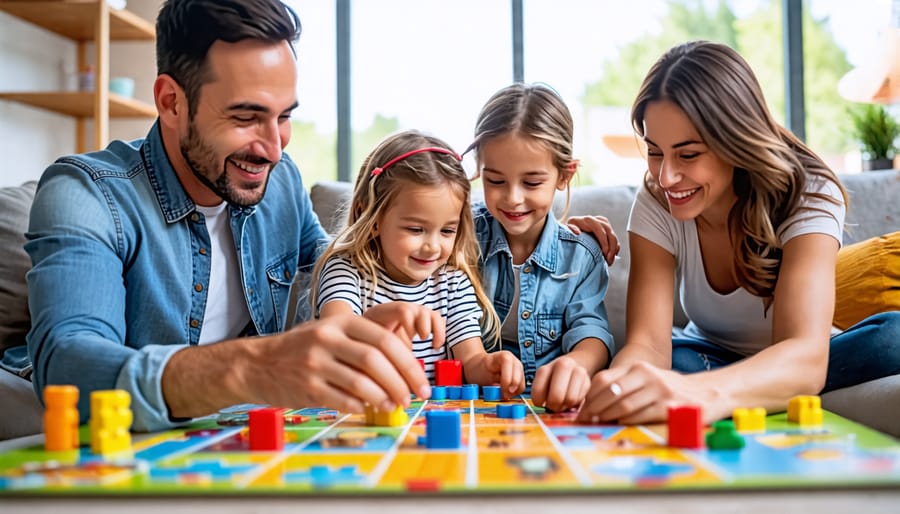Embark on a 7-day mental detox to refresh and rejuvenate your child’s mind. Disconnect from digital devices for at least an hour each day, encouraging outdoor play, creativity, and face-to-face interaction. Practice mindfulness together through simple breathing exercises, guided meditations, or gratitude journaling. Prioritize sleep by establishing a consistent bedtime routine, creating a calm sleep environment, and limiting screen time before bed. Engage in daily physical activity, such as walks, bike rides, or yoga, to boost mood and reduce stress. Foster open communication by actively listening to your child’s thoughts and feelings without judgment, offering support and validation. Incorporate brain-nourishing foods like fruits, vegetables, whole grains, and lean proteins into your child’s diet while limiting processed snacks and sugary drinks. Dedicate time each day for self-care activities your child enjoys, such as reading, drawing, or listening to music, to promote relaxation and self-discovery.
Day 1: Digital Disconnect
In today’s digital age, it’s easy for children to become consumed by screens and electronic devices. While technology offers many benefits, excessive screen time can negatively impact mental health. That’s why we encourage families to take a break from digital devices and reconnect with each other and the world around them.
Unplugging for a day allows children to rediscover the joys of imaginative play, creativity, and quality family time. Instead of scrolling through social media or playing video games, suggest activities that foster bonding and self-expression. Have a family board game marathon, organize a backyard scavenger hunt, or explore a nearby nature trail together. Encourage your children to express themselves through art, writing, or music, without the pressure of likes and followers.
As you plan your digital disconnect day, involve your children in the process. Ask them what screen-free activities they’d like to try, and be open to their suggestions. By giving them a sense of ownership and choice, they’ll be more likely to embrace the experience.
Remember, the goal isn’t to demonize technology but to create a healthy balance. Use this day to model mindful tech habits and engage in meaningful conversations with your children. By disconnecting from devices and reconnecting with each other, you’ll help your children build resilience, strengthen family bonds, and cultivate a more positive relationship with technology in the long run.

Day 2: Mindfulness Monday
Mindfulness is a powerful tool for helping children manage their emotions and reduce stress. By introducing age-appropriate mindfulness practices, you can help your child develop valuable skills for emotional regulation and overall well-being.
One simple practice is deep breathing. Encourage your child to take slow, deep breaths, focusing on the sensation of the air moving in and out of their body. You can make it fun by having them imagine blowing up a balloon or pretending to be a tree swaying in the wind. Deep breathing helps calm the nervous system and promotes a sense of relaxation.
Guided imagery is another effective mindfulness technique. Ask your child to close their eyes and imagine a peaceful scene, such as a beautiful beach or a serene forest. Encourage them to engage all their senses, noticing the sights, sounds, smells, and sensations of their imagined environment. This practice can help children feel grounded and secure, even in the face of stress or anxiety.
Yoga is also a wonderful way to incorporate mindfulness into your child’s routine. Simple poses like mountain pose, child’s pose, or cat-cow stretch can help children connect with their bodies and quiet their minds. Encourage them to focus on their breath and the sensations they experience as they move through each pose.
Remember, the key to success with mindfulness is consistency and patience. Start with short, simple practices and gradually build up over time. By making mindfulness a regular part of your child’s life, you’ll be giving them a valuable tool for navigating life’s challenges with greater ease and resilience.

Day 3: Gratitude Journaling
Starting a gratitude journal is a powerful way to help children cultivate a positive mindset and build resilience. Research has shown that regularly practicing gratitude can lead to increased happiness, better sleep, and improved relationships. Encourage your child to set aside a few minutes each day to write down three things they are thankful for. These can be simple joys, like a funny joke shared with a friend, a delicious meal, or a beautiful sunset. The act of focusing on the good in their lives helps children develop a more optimistic outlook and cope better with challenges.
Make the gratitude journal a special, personal space for your child to express their thoughts and feelings. Let them choose a notebook that inspires them, and encourage them to decorate it with stickers, drawings, or photos that make them smile. Remind them that there are no right or wrong answers in their journal—it’s a place for them to reflect on the positives in their own unique way. As they build the habit of gratitude journaling, they’ll learn to appreciate the small moments of joy in each day and develop a stronger sense of self-awareness and contentment.
Day 4: Nature Immersion
Nature has an incredible power to soothe the mind and rejuvenate the spirit. On Day 4 of your mental detox, plan a day outdoors to immerse yourself in the beauty of the natural world. Whether you choose to go for a hike in the mountains, have a picnic in a lush park, or spend time at the beach, being in green spaces can work wonders for your mental health.
Research has shown that spending time in nature can reduce stress, improve mood, and boost overall well-being. The fresh air, natural light, and peaceful surroundings provide a much-needed break from the constant stimulation of modern life. As you walk through a forest or sit by a babbling brook, take deep breaths and allow yourself to be fully present in the moment.
Notice the intricate details of the world around you – the patterns on a leaf, the sound of birdsong, or the feel of the sun on your skin. This mindful connection with nature can help you feel grounded and centered, putting your worries and anxieties into perspective.
In addition to the mental health benefits, spending time outdoors can also encourage physical activity, which is essential for maintaining a healthy relationship with food and overall well-being. As you explore nature, you’ll be moving your body and releasing endorphins, the body’s natural mood-boosters.
So, take this opportunity to unplug from technology, leave your worries behind, and simply be in the moment. Let nature work its magic on your mind and soul, leaving you refreshed and ready to tackle the rest of your mental detox journey.

Day 5: Creative Expression
Embracing creative expression is a powerful way to nurture your child’s mental well-being. Set aside a day during the mental detox week to explore various artistic outlets together. Whether it’s painting, drawing, sculpting, or crafting, the act of creating something tangible can be incredibly therapeutic for children. Encourage them to express their feelings and experiences through their artwork, fostering a safe space for emotional release.
Music is another fantastic medium for creative expression and stress relief. Invite your child to sing, dance, or play an instrument, allowing them to lose themselves in the joy of making music. You can also introduce them to different genres and artists, expanding their cultural horizons and providing new avenues for self-expression.
Storytelling is a timeless art form that allows children to tap into their imagination and process their emotions. Encourage your child to write a short story, create a comic book, or even perform a puppet show. Through these narratives, they can explore their fears, hopes, and dreams in a safe and creative manner.
Remember, the goal of this creative day is not to produce masterpieces but rather to provide a healthy outlet for your child’s emotions and stress. Celebrate their efforts and engage in meaningful conversations about their creations. By nurturing their creative spirit, you’re helping them build resilience, self-awareness, and a positive sense of self-expression that will serve them well beyond the mental detox week.
Day 6: Connection and Communication
In today’s fast-paced world, it’s easy to get caught up in the hustle and bustle of daily life, neglecting the importance of connecting with our loved ones. Day 6 of the mental detox is all about fostering open, honest communication and building strong, supportive relationships within your family.
Take the time to sit down with your children and engage in active listening. Encourage them to share their thoughts, feelings, and experiences without judgment. By creating a safe space for them to express themselves, you help build trust and strengthen your bond.
When communicating with your children, practice empathy and validate their emotions. Use “I” statements to express your own feelings and avoid blaming or criticizing. For example, instead of saying, “You’re always so moody,” try, “I feel concerned when I see you upset. Can we talk about what’s bothering you?”
Engage in activities that promote connection, such as family game nights, shared meals, or outdoor adventures. These shared experiences create lasting memories and provide opportunities for meaningful conversations.
Remember, building strong, supportive relationships takes time and effort. Be patient, consistent, and always lead with love and understanding. By prioritizing connection and communication, you help your children develop the emotional intelligence and resilience they need to navigate life’s challenges with confidence.
Day 7: Self-Care Sunday
On the final day of the mental detox, prioritize self-care and teach your child the importance of nurturing their own well-being. Encourage them to engage in activities that bring them joy, relaxation, and a sense of comfort. A warm bubble bath with their favorite toys or a soothing lavender scent can help them unwind and destress. Cuddling up with a beloved book or stuffed animal can provide a sense of security and happiness. Prepare a healthy treat together, like fresh fruit popsicles or a colorful veggie platter, and enjoy it while discussing the highlights of their week. Emphasize that taking care of oneself is not selfish, but rather essential for maintaining a healthy mind and body. Lead by example and share your own self-care practices, such as taking a few moments to stretch, sipping a cup of herbal tea, or writing in a gratitude journal. By instilling these habits early on, you empower your child to prioritize their mental health and develop resilience in the face of life’s challenges. Remember, self-care is not a luxury, but a necessity for overall well-being. Celebrate the completion of this mental detox week and encourage your child to continue incorporating these practices into their daily routine for a happier, more balanced life.
Conclusion
Congratulations on completing your 7-day mental detox! By dedicating a week to focusing on your mental well-being, you’ve taken a significant step towards a healthier, more balanced life. Remember, the strategies and habits you’ve practiced during this detox are not meant to be temporary fixes, but rather long-term tools to nurture your child’s mental well-being. Incorporating digital disconnection, mindfulness, gratitude, physical activity, and self-care into your daily routine can help you maintain a positive mental state and build resilience in the face of life’s challenges.
It’s essential to prioritize your mental health and make it a daily practice. If you find yourself struggling or in need of additional support, don’t hesitate to reach out to a trusted friend, family member, or mental health professional. Remember, seeking help is a sign of strength, not weakness. With the right tools, mindset, and support, you can continue to thrive and live your best life. Keep up the great work, and know that you have the power to create a happier, healthier future for yourself and those around you.







